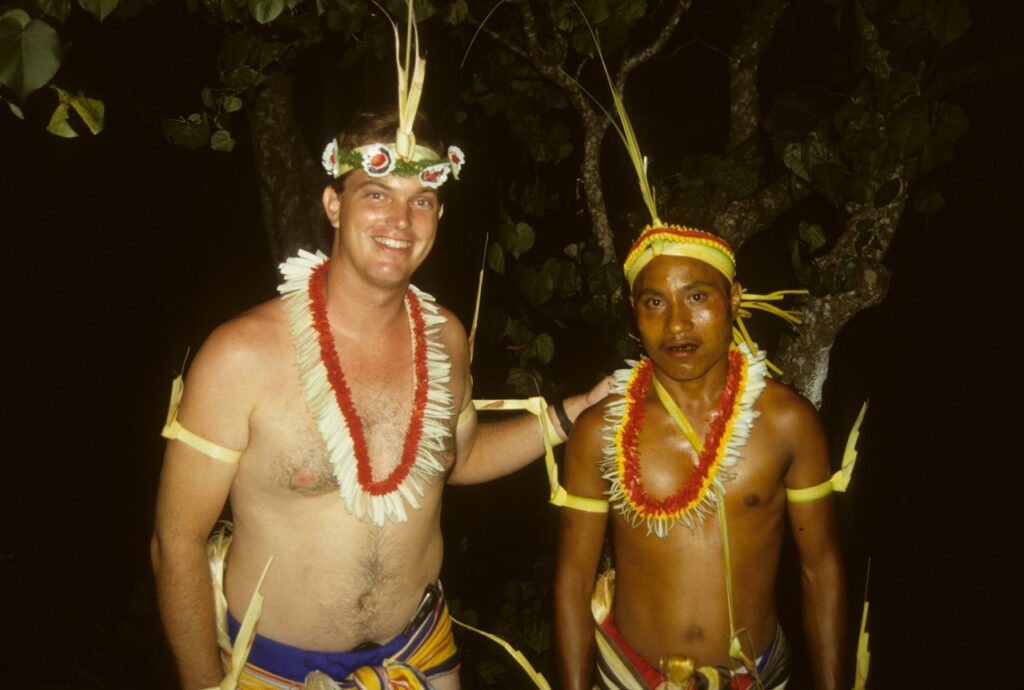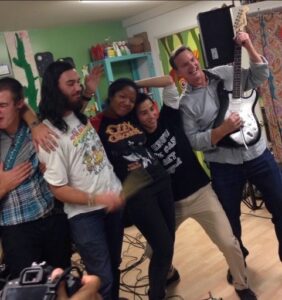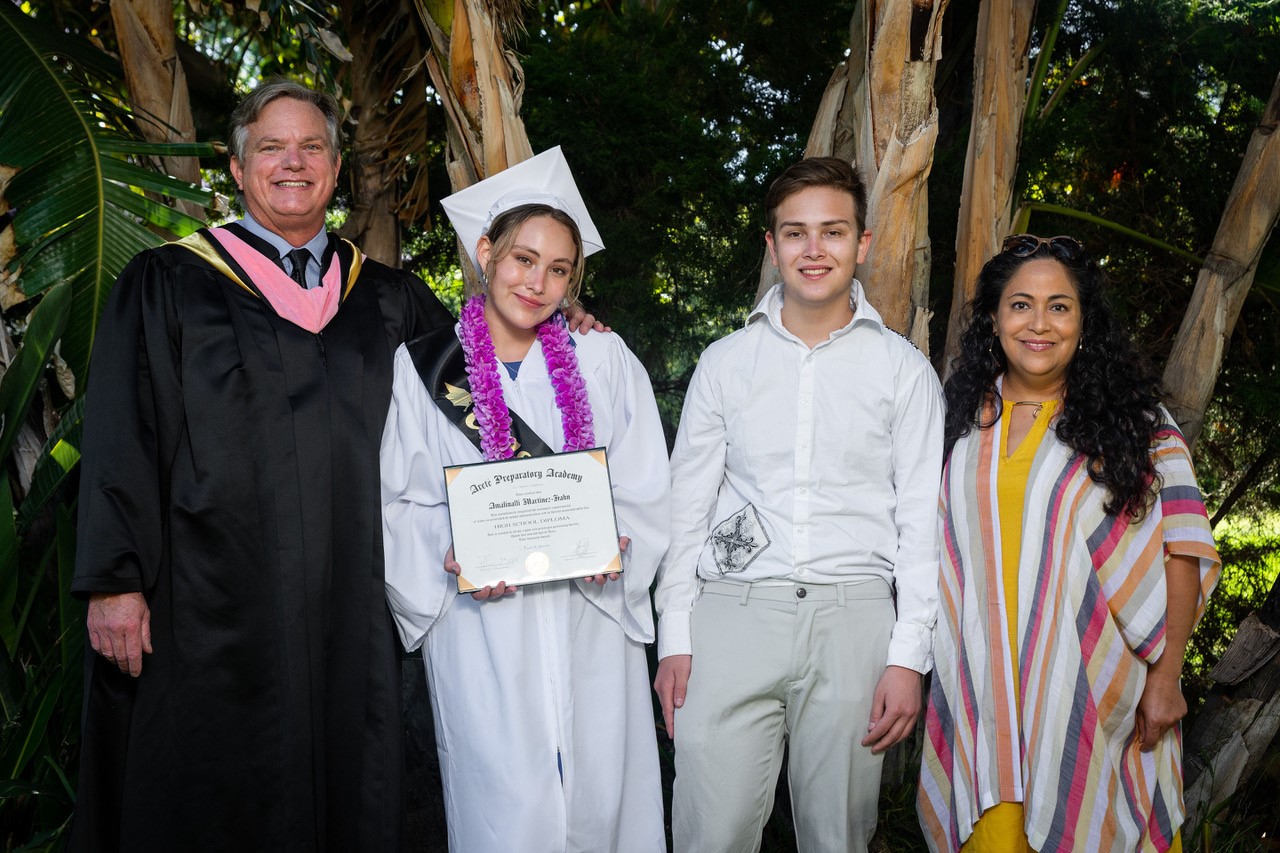
Jim Hahn, the founder of Arete Academy, spent time on the island of Yap in Micronesia, learning the ways of tribe, after receiving his master’s degree in anthropology from UC San Diego.
By LAUREL BUSBY
Special to CTN
As a young man, Jim Hahn, 54, became both a Fulbright scholar and a member of a group of “ne’er-do-wells” on the island of Yap in Micronesia.
An anthropologist, Hahn attempted to “blend in and become part of the culture” of this group of men. The effort included not only hanging out, chatting, and observing them, but also learning a men’s dance that, due to his severe lack of skills, required private instruction from an islander who eventually became his research assistant.
The experience “was extraordinary,” said Hahn, who grew up in Sunset Mesa. “Being completely outside of one’s familiar culture and having to relearn not just a language but a set of cultural values and expectations, I found really exciting and challenging and at times frustrating, but you come out of an experience like that with a perspective on your own culture and culture in general that is both liberating and invaluable.”
Upon returning to Los Angeles in 1995, Hahn, who had earned both a B.A. and a master’s in anthropology from UCLA and UC San Diego respectively, spent a decade focusing on a different group—local students at first Crossroads and then New Roads schools. At New Roads, Hahn taught world civilizations, a course that he said tended to be approached with boredom by both students and teachers.
Although initially using a textbook, Hahn began to veer into different terrain after a couple of years to approach the subject through asking big questions without obvious answers, such as “What is human nature?” and “Are morals relative to culture?”
“Students became different animals academically when they realized that I wasn’t just asking a question that could be looked up on the internet or in my teacher’s edition,” Hahn said. “I was asking a question I didn’t have an answer to. I cared what they said, and I wasn’t faking it. Being a scholar and being a thinker is a lot different than behaving as a student. We set a low bar and kids respond by not bringing their best game.”
As the students explored one question in depth over a semester, they developed opinions and honed arguments. They also formed tribes with particular viewpoints, competing in a good-natured way for members.
Some teens improved their leadership skills by wooing followers, while others, who normally tended to stay on the periphery, were drawn in because they were required to choose a tribe. Sometimes a student might have an epiphany and break away to form a new tribe, Hahn said. The project engaged the students so much that 15 or more years later, many of the details remain fresh for them.
“I have lunch with them still,” Hahn said. “They still remember what tribe they made for human nature—more Hobbesian or more Rousseauian.”
After seven years at New Roads, in 2008, Hahn and his wife at the time, Elizabeth, decided to enhance the experiment by creating their own school. Their goal was to not only delve into complicated questions, but also nourish student passions.
The result, Areté Preparatory Academy, began with only five students learning together in two dilapidated houses at Idaho and Bundy. Hahn’s father, Jim, a former Palisades Rotary Club president, owned the homes, enabling them to start the school on a shoestring.

Students are allowed to explore different passions at Arete.
In addition to seminar-style classes that prioritized discussion and depth, the school also featured a workshop for woodworking and other hands-on adventures, which varied from building a trebuchet that launched objects down the alley to creating elaborate Rube Goldberg machines.
“A lot of kids grow up not having experience working with their hands, whether it’s woodworking or cooking or tinkering, so we’ve tried to incorporate those types of subjects into our arts program,” Hahn said.
Hahn’s great-grandfather was a carpenter, and some of his skills have passed along through the generations, which now includes Amy, 18, a 2020 Areté graduate, and Diego, 16, a tenth grader at Areté. Like their father, Amy and Diego are growing up in Sunset Mesa, where they live next door to their grandparents, Jim and Jeanne.
After two years, the school, which added a middle school in 2019, moved into its current space, an office building on Olympic near Bundy in West L.A. The curriculum comprises not only the standard academic subjects, including varied foreign languages ranging from Spanish to Japanese, but also four years of philosophy. These courses delve into topics ranging from utopias to Feminist Killjoys, the latter course suggested by Amy since student interest is a driving force in which classes are offered.
For example, students sought an elective in entrepreneurship this year, and so the course was created.
“There’s no limit” to the classes that will be offered, said Hahn, who noted that if necessary, classes are created for one student. “We’re never going to get in the way of a kid’s passion.”
Twice a year, the school stops all classes for two weeks to provide time to delve into a single topic deeply with each student writing a paper and creating a presentation about their chosen topic, which last year ranged from “moral communities of artificial and human life” to “the media’s manipulation of perception.”
Although the school has grown, it has remained small as the goal has been to keep enrollment around 50 students.
This small size allows for more personal connection between students and faculty, so teachers can challenge students to make meaningful choices in their work. Thus, instead of taking tests as in a traditional school, each student creates a resume of independent scholarship. Aside from developing a student’s passions, when the time comes for writing college recommendation letters, the faculty can provide insight into who the student has become during the four years.
“It’s not the usual ‘always showed up in class ready to learn,’” said Hahn, whose wife, Mio, is an educational consultant. “It’s so much more substantive than that. I’m not sure people even grasp that that’s possible. It’s not Hallmark card either—‘three cheers for a great fellow.’ We’re describing authentically their ability to do the real currency of academia. We’re challenging them to be passionate learners and not just game their way through someone else’s system.”
This choice has meant annually about 95 percent of seniors are accepted into their first-choice college. Hahn’s daughter was accepted into all seven colleges to which she applied—Sarah Lawrence, Reed, Lewis & Clark, Wesleyan, Oberlin, Vassar and Pitzer, where she enrolled in the fall.
Senior Camille Colker, who transferred into Areté three years ago as a sophomore and has already received seven college acceptances, including from UT-Austin and two UCs, said, “The most unique thing about Areté, especially as someone who has previously gone to a traditional, highly competitive prep school, is the method of assessment in my classes. I don’t take tests at Areté, and though that may be shocking to people who are used to that model, it’s really more reflective of the kind of work I’ll be doing after high school…. I can pursue independent inquiry with the support of my teachers, who are some of the best minds in Los Angeles.”
Support combined with challenge is part of the goal, so some students have rushed ahead in subjects like mathematics by taking calculus as ninth graders and individualized advanced math in later years. Small class sizes, which may include only a few students to a maximum of about a dozen, also allow students to receive extra support if needed.
Enrollment has been strong, despite the fact that the school has barely advertised or marketed itself. Word-of-mouth has been the growth factor instead.
“We wanted to avoid having the mission and the vision be driven by the market or by what parents thought they wanted as opposed to what students want and what we as educators know students should have,” Hahn said. “It’s not just a shrunken version of a larger classroom. The conversation is not just there because it’s fun and kids like talking. It’s a way to push deeper understanding…. If you’re engaged, it sticks. It sticks longer and better than having a test every two weeks.”

Jim with children Amy and Diego, and their mother Elizabeth, at Amy’s graduation from Arete Preparatory Academy. Photo: Tadeo Huazo
(Editor’s note: CTN contributor Laurel Busby’s son is currently a sophomore at Arete.)
